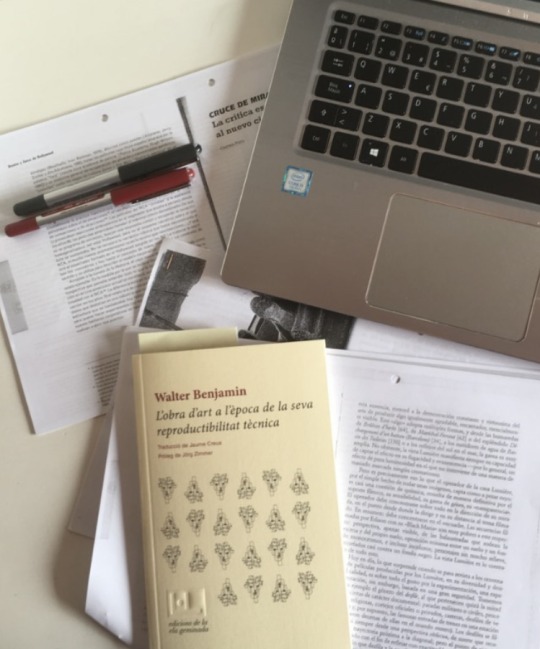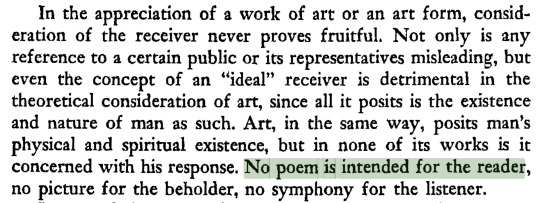#Walter Benjamin
Explore tagged Tumblr posts
Text
Einer, der sich verlassen glaubt, liest und es schmerzt ihn, daß die Seite, die er umschlagen will, schon aufgeschnitten ist, daß nicht einmal sie ihn mehr braucht.
Walter Benjamin
1 note
·
View note
Text

Banner displayed at the student protests for Palestine at the University of Toronto, posted by assistant professor Esmat Elhalaby on Twitter. The central figure on the bannet is an imitation of Paul Klee's Angelus Novus, famously discussed in Walter Benjamin's Theses on the Philosophy of History. The accompanying text— reading "The only thing in the world worth beginning... the end of the world, of course!"—is from Aimé Césaire's Notebook of a Return to the Native Land.
You can read the Benjamin essay and see the original Klee work here. PDF of the Césaire book here.
1K notes
·
View notes
Text
I’m happy everyone’s enjoying the Brecht-Benjamin posting. here’s a photo of them playing chess:

And one of Benjamin’s diary entries recounting a comment Brecht had made about chess:

From ‘Conversations with Brecht’ in Aesthetics and Politics (1977)
374 notes
·
View notes
Text


currently working on an essay on walter benjamin's the work of art in the age of mechanical reproduction.
#study#studyblr#study blog#studygram#student#college#university#essay#studyblr community#studyspo#Walter Benjamin#book#bookblr#bookstagram#reader#writer#writers community#writers on tumblr#neutral palette
741 notes
·
View notes
Text

Emilio Tadini (1927-2002) — Angelus Novus [enamel on canvas, 1978]
92 notes
·
View notes
Text

"Fascism attempts to organize the newly proletarianized masses without affecting the property structure which the masses strive to eliminate. Fascism sees its salvation in giving these masses not their right, but instead a chance to express themselves. The masses have a right to change property relations; Fascism seeks to give them an expression while preserving property. The logical result of Fascism is the introduction of aesthetics into political life. Mankind, which in Homer’s time was a spectacle for the Olympian gods, has become one for itself. Communism responds by politicizing art." — Walter Benjamin
#late stage capitalism#leftblr#working class#left wing#class war#leftist#news#socialism#communism#walter benjamin
228 notes
·
View notes
Text

from illuminations by walter benjamin
70 notes
·
View notes
Text
Nothing is sillier, dryer, more emasculated, more castrated than current American academic writing on the Frankfurt school by people who have never heard a mob in a street, who have never smelled a prison, who have never known what a concentration camp is, who don't know one single thing about the fact that these men lived their abstractions in bone and blood and gut and tripe, that they lived their century as our slick mandarins don't. These American discussions about the nuances of meaning in the sociology of the middle Adorno are hair-raising. They would have filled Adorno with sarcasm and wonder and a sense of defeat.
George Steiner, Paris Review interview
124 notes
·
View notes
Text

Not to find one's way in a city may well be uninteresting and banal. It requires ignorance - nothing more. But to lose oneself in a city - as one loses oneself in a forest - that calls for a quite different schooling. Then, signboard and street names, passers-by, roofs, kiosks, or bars must speak to the wanderer like a cracking twig under his feet in the forest.
-- Walter Benjamin
(Lyon, France)
#cities#lost#signs#walter benjamin#travel photography#lyon#france#street photography#streets#getting lost#urban jungle#quote
161 notes
·
View notes
Quote
Mechanical reproduction emancipates the work of art from its parasitical dependence on ritual. To an ever greater degree the work of art reproduced becomes the work of art designed for reproducibility. From a photographic negative, for example, one can make any number of prints; to ask for the “authentic” print makes no sense. But the instant the criterion of authenticity ceases to be applicable to artistic production, the total function of art is reversed. Instead of being based on ritual, it begins to be based on another practice – politics.
Walter Benjamin, "The Work of Art in the Age of Mechanical Reproduction"
#philosophy#quotes#Walter Benjamin#The Work of Art in the Age of Mechanical Reproduction#reproduction#mechanism#art#artworks#politics
95 notes
·
View notes
Text

#peoplematchingartworks#gisele freund#walter benjamin#bode museum#stefandraschan#photography#contemporaryart#berlin
28 notes
·
View notes
Text
Benjamin’s account of catching butterflies and moths in his youth summarises so well the motivations behind his writing:
Between us, now, the old law of the hunt took hold: the more I strove to conform, in all the fibers of my being, to the animal—the more butterfly-like I became in my heart and soul—the more this butterfly itself, in everything it did, took on the color of human volition; and in the end, it was as if its capture was the price I had to pay to regain my human existence.
Walter Benjamin, Berlin Childhood around 1900
68 notes
·
View notes
Text

Walter Benjamin and his son
129 notes
·
View notes
Text

Passage du Saumon, Paris [photo by J. Barry, 1899]
189 notes
·
View notes
Text

21 notes
·
View notes
Text
In France, the “phony war,” as it became popularly known, did not seem so phony for [Walter] Benjamin. On September 3, placards appeared in Paris, ordering Germans to show up with a blanket at the Stade de Colombes, the capital’s Olympic stadium .... From there he and a group of 300 émigrés were transferred to the Château de Vernuche, near the town of Nevers. They traveled part of the way by train and walked the rest. The forced march was onerous for Benjamin with his heart condition. Despite the fact that this was a château, it was not exactly hospitable. Moving into a completely empty and cold building, they slept on the floor until straw was found. According to Eiland and Jennings, Benjamin “established himself in a sort of lean-to beneath a circular stairway, a burlap drape allowed him something like privacy.” Benjamin showed his mettle during the two months at Vernuche. He did not yield to despair. The commandant did distribute armbands that permitted detainees to go to Nevers. The consummate intellectual, Benjamin offered lectures and philosophical seminars. His payment consisted of Vernuche’s currency—mainly cigarettes and buttons. Under his direction plans were laid for a journal under Benjamin’s editorial direction. Titled Bulletin de Vernuche: Journal des Travailleurs du 54e Regiment (Vernuche Bulletin: Journal of the Workers of the 54th Regiment), its first issue was to have included a studies of camp life from a sociological perspective, reviews of art produced at Vernuche, and pieces about what detainees read.
This article's elegantly matter-of-fact writing gives me a more harrowing sense of impending doom than most horror stories but also this brief anecdote is so charmingly hilarious to me. Guy afflicted with Terminal Academia.
24 notes
·
View notes